Rose Read online
“THE MOST FASCINATING AND AMBITIOUS THRILLER OF THE YEAR.”
—San Francisco Chronicle
“Superior … Rose has one of those powerfully involving plots that keeps you in an enjoyable dither, eager to turn the pages and reluctant to reach the last one.… Rose clearly transcends the genre.”
—Chicago Tribune
“Rich in historical and social detail … In Rose, Smith has once again succeeded in giving us a book that brings alive a people and place previously foreign. He’s made Wigan as real as Moscow.”
—The Washington Post Book World
“Intriguing … Admirable.”
—Los Angeles Times
“THOROUGHLY INVOLVING …
Vivid writing and consummate storytelling … Rose is a work of Dickensian complexity and plot twists, a literate mystery that’s as much concerned with the workings of the human heart as it is with whodunit and why.”
—Houston Chronicle
“Smith molds a spirited, sexy mystery and fires it with his characteristic love of atmosphere.… Smith’s extravagant talent runs the spectrum here from sparkling dialogue and tantalizing mystery to grim, graphic descriptions of mining life that sear both the conscience and the imagination.”
—Publishers Weekly
“Although they live in different eras, Jonathan Blair, the hero of Rose, is not so different from Arkady Renko, the protagonist of Smith’s Soviet novels.… [Smith is] a master craftsman at atmosphere.… Fine writing and witty dialogue.”
—USA Today
“Blair is out of Graham Greene and John le Carré…. The repartee in Rose is as sharp as a dagger … Another book on the exploits of Jonathan Blair would be very welcome.”
—The New York Times
“VINTAGE MARTIN CRUZ SMITH:
full of menace and surprises, meticulously plotted, with terrific dialogue.… Like Arkady Renko, Blair is resourceful [and] tenacious.”
—St. Petersburg Times
“The most compelling adventure written so far this year.… The surprise ending warms the cockles and one is left in the afterglow of Cruz Smith’s genius.… A book whose writing delights and whose characters, dialogue, and insights knock socks off.”
—Blade (Toledo, OH)
“Crackling good … Blair is a nuanced, memorable character, a match for Arkady Renko of the Gorky Park series.”
—Oregonian
“A splendid mystery … Probably [Martin Cruz Smith’s] best work since his debut.”
—Detroit News and Free Press
A Ballantine Book
Published by The Random House Publishing Group
Copyright © 1996 by Martin Cruz Smith
Map copyright © 1996 by Anita Karl and James Kemp
All rights reserved.
Published in the United States by Ballantine Books, an imprint of The Random House Publishing Group, a division of Random House, Inc., New York, and simultaneously in Canada by Random House of Canada Limited, Toronto.
Ballantine and colophon are registered trademarks of Random House, Inc.
www.ballantinebooks.com
Library of Congress Catalog Card Number: 99–91677
eISBN: 978-0-307-80976-6
This edition published by arrangement with Random House, Inc.
First Ballantine Books International Edition: March 1997
First Ballantine Books Domestic Edition: February 2000
v3.1
Contents
Cover
Title Page
Copyright
Map
Chapter 1
Chapter 2
Chapter 3
Chapter 4
Chapter 5
Chapter 6
Chapter 7
Chapter 8
Chapter 9
Chapter 10
Chapter 11
Chapter 12
Chapter 13
Chapter 14
Chapter 15
Chapter 16
Chapter 17
Chapter 18
Chapter 19
Chapter 20
Chapter 21
Chapter 22
Chapter 23
Chapter 24
Chapter 25
Chapter 26
Chapter 27
Chapter 28
Chapter 29
Dedication
Acknowledgments
Other Books by This Author
The most beautiful women in the world were African.
Somali women wrapped in robes suffused with purple, vermilion, pink. Around their necks beads of amber that, rubbed together, emitted electricity and the scent of lemons and honey.
Women of the Horn who peered through veils of gold, strands in the shape of tinkling teardrops. They stood veiled in black from head to toe, their longing compressed into kohl-edged eyes. In the Mountains of the Moon, Dinka women, dark and smooth as the darkest smoothest wood, tall and statuesque within beaded corsets that would be cut open only on their wedding nights.
And the women of the Gold Coast in golden chains, bells, bracelets, dancing in skirts of golden thread in rooms scented by cinnamon, cardamom, musk.
Jonathan Blair awoke tangled in damp sheets and shivering to the rain, gas fumes and soot that pressed against his lodging’s single window. He wished he could slip back into his dream, but it was gone like smoke. The Africa in his bloodstream, though, that was forever.
He suspected he had typhoid. His bedclothes were dank from sweat. The week before, he had been yellow from his eyeballs to his toes. He pissed brown water, a sign he had malaria. Which last night had demanded quinine and gin—at least he had demanded it.
Outside, morning bells rang in another foul day, resounding like blood vessels exploding in his brain. He was freezing, and on the room’s miniature grate a pitiful mouthful of coals was fading under ash. He swung his feet onto the floor, took one step and collapsed.
He came to an hour later. He could tell by another outburst of bells, so there was some point to God after all, as a celestial regulator with a gong.
From the floor Blair had a low but excellent view of his sitting room: threadbare carpet of tea stains, bed with wrestled sheets, single chair and table with oil lamp, wallpaper patched with newspaper, window of weepy gray light that showed dead ashes on the grate. He was tempted to try to crawl to the chair and die in a sitting position, but he remembered that he had an appointment to keep. Shaking like an old dog, he struck out on all fours toward the fireplace. Chills squeezed his ribs and twisted his bones. The floor pitched like the deck of a ship, and he passed out again.
And came to with a match in one hand and a newspaper and kindling in the other. He seemed to do as well unconscious as conscious; he was pleased with that. The paper was folded to the Court Circular for March 23, 1872. HRH the Princess Royal will attend a patrons meeting at the Royal Geographical Society with Sir Rodney Murchison, president of the RGS, and the Right Reverend Bishop Hannay. In attendance will be … That was yesterday, which meant he had missed the festivities, had he been, well, invited, and possessed the cab fare. He struck the match and used all his strength to hold the sulfurous flame under the paper and sticks, and to push them under the grate. He rolled on his side to the scuttle. Please, God, he thought, let there be coal. There was. He laid a handful on the fire. A kettle hung over the grate. Please, God, he thought, let there be water. He tapped the kettle and heard its contents slosh from side to side. He fed the fire more paper and more coal, and when the coal had caught he lay as close as he could to the fire’s warming breath.
He didn’t like English tea. He would have preferred sweet Moroccan minted tea served in a glass. Or thick Turkish coffee. Or a tin cup of American boiled coffee. In London, however, he thought this was probably abo
ut as pleasant as life could get.
Once he’d had his tea, Blair chanced getting dressed. Fashioning his scarf into a sort of tie gave him problems, since he couldn’t raise his arms without triggering the shakes. Because he hadn’t dared put a razor near his throat for days he had the beginnings of a beard. He did still have decent clothes and a pocket watch to tell him that if he was going to walk from Holborn Road to Savile Row—he certainly didn’t have money to ride—he had to leave at once. Ordinarily the route was half an hour’s stroll. Today it lay before him like a passage through mountains, deserts, swamps. He leaned against the window and stared down at the hunched backs of cabs and vying streams of umbrellas on the sidewalks. The glass reflected a face that was raw and high-colored by a life spent out-of-doors. Not a friendly or comfortable face, even to its owner.
Going down the stairs he swayed like a sailor. As long as he didn’t break a leg he’d be fine, he told himself. Anyway, this was an appointment he couldn’t afford to miss, not if he wanted to get out of England. He’d crawl on his elbows to do that.
London assaulted him with the steaming smell of horse droppings, the shouts of a rag wagon contending with a line of hackney cabs, the argument punctuated with explosive discharges of phlegm. The boulevards of Paris were washed once a day. In San Francisco dirt at least rolled down to the bay. In London filth accreted undisturbed but for the daily piss from the heavens, creating a stench that made the nose weep.
Well, that was what England itself was like, a snuffling nose set by the blue eye of the North Sea, Blair thought. This other Eden, this sceptered isle, this chamber pot beneath the sky. And every subject proud of his umbrella.
At this end of Holborn Road the local tribes were Jews, Irish and Romanians, all dressed in bowlers and drab rags. Every block had its pawnshop, mission hall, tripe house, oyster stall, brace of alehouses. If the surrounding stench was a miasma, the inhabitants on the street took no more notice than fish took of salt water. Horse-drawn buses with open upper decks lurched through layers of drizzle and fog. Men in sandwich boards carried the offers of chiropractors, dentists, psychics. Women in sodden boas offered glimpses of rouge and venereal disease. Corner vendors sold French rolls, penny rolls, hot potatoes and newspaper headlines announcing HEARTSICK STRANGLER KILLS BABE, MUM! How the editors sorted out which of the daily multitude of urban atrocities to sell, Blair couldn’t imagine.
Halfway, by Charing Cross, billboards advertised the staples of middle-class life: liver pills and elderberry, Nestlé’s milk and Cockburn’s sherry. Here the population was transformed to a masculine society in black suits and top hats: clerks with one hand clutching their collars, tradesmen with cotton gloves and ribboned boxes, barristers in vests festooned with silver fobs, all jostling with umbrellas. Blair had no umbrella himself, only a broad-brimmed hat that diverted rain onto the shoulders of his mackintosh. On his feet he had a pair of leaky Wellingtons, the soles lined with pages torn from a mission hymnal: “A Closer Walk with Thee” in the left boot. He stopped every other block to rest against a lamppost.
By the time he reached St. James’s, the chills had returned as spasms that made his teeth chatter. Although he was late, he turned into a public house with a chalkboard that declared CHEAPEST GIN. He laid his last coin on the bar and found himself given ample room by the regulars, a lunchtime gallery of shop assistants and apprentices with the drawn faces of mourners in training.
The bartender delivered a glass of gin and said, “There’s pickled eggs or oysters comes with that, if you want.”
“No, thanks. I’m off solids.”
Every eye seemed to watch him down the glass. It wasn’t simply that their faces were white. Compared with other complexions, British skin had the sallow shine that reflected a sun long lost in a pall of smoke. A boy with brighter eyes edged along the counter. He wore a green band on his hat, a purple tie squashed as flat as a cabbage leaf and yellow gloves with rings on the outside.
“Illustrated London News,” he said and extended a hand.
A reporter. Blair didn’t wait for his change. He pushed himself away from the bar and plunged through the door.
The boy had a grin of someone who had found a pearl in his oyster. “That was Blair,” he announced. “Blair of the Gold Coast. Nigger Blair.”
His destination was in the sort of Savile Row town house that merchant banks and clubs were fond of: an entrance between banded columns, three floors of windows overhung with marble crenellation that expressed confidence, propriety, discretion. A brass plaque on a column read THE ROYAL GEOGRAPHICAL SOCIETY.
“Mr. Blair.” Jessup, the steward, was always solicitous for reasons Blair never understood. He helped Blair off with his hat and coat, led him to the rear of the cloakroom and fetched him tea and milk. “How are you feeling, sir?” he asked.
“A little chilled, just the smallest bit.” Blair was trembling so hard from the short dash from the pub that he could barely keep the tea in the cup.
“Gunpowder tea will set you straight, sir. It’s good to see you again, sir.”
“A pleasure to see you, Jessup. The Bishop is still here?”
“His Grace is still here. One of the men just took him some cheese and port. You catch your breath. I read the reports of your work with great interest, sir. I hope there will be more accounts to come.”
“I hope so, too.”
“Do you think you can stand, sir?”
“I believe I can.” The shakes were subsiding. He got semi-briskly to his feet and Jessup brushed his jacket.
“Gin will rot your insides, sir.”
“Thank you, Jessup.” He started to move while he was still faintly refreshed.
“You’ll find the Bishop in the map room, sir. Please be careful. He’s in a mood.”
The map room was testimony of the Society’s contribution to exploration and knowledge. It had started as the African Association. A great map delineated expeditions the Society had sponsored: Mungo Park up the Niger, Burton and Speke to Lake Victoria, Speke and Grant to the White Nile, Baker to Uganda in search of Speke, Livingstone to the Congo. The walls were two levels of book and map shelves, the upper walkway supported by cast-iron columns and a spiral stairway. Watery light showed through the glass roof. In the middle of the room a mounted globe showed the British possessions as an earth-girdling corporation in imperial pink.
By the globe stood Bishop Hannay, a tall man of middle age in a black woolen suit and the inverted V of an ecclesiastical collar. Because most English dressed in black they seemed a nation in perpetual grief, but the somber cloth and white collar only emphasized the Bishop’s inappropriate vigor and the bluntness of his gaze. He had ruddy skin with red lips, and dark hair gone gray and wild at the temples and brows as if singed.
He said, “Sit down, Blair. You look like hell.”
Two high-back chairs were at a map table set with cheese and port. Blair accepted the invitation to collapse.
“It’s good to see you again, too, Your Grace. Sorry about being late.”
“You stink of gin. Have some port.”
Hannay poured him a glass, taking none for himself.
“You’re in bad odor altogether, Blair. Embezzlement of charitable funds, willful disobedience of orders, abetting slavery, for God’s sake! You embarrassed the Society and the Foreign Office. And you were my recommendation.”
“I only took funds that were owed me. If I could meet with the Board of Governors—”
“If you did, they’d slap your face and turn you out the door.”
“Well, I’d hate to provoke them to violence.” Blair refilled the glass and looked up. “You’ll listen to me?”
“I’m not as easily shocked as the others—I expect moral turpitude.” The Bishop sat back. “But, no, I won’t listen because it would be a waste of time. They resent you for reasons that have nothing to do with the accusations.”
“Such as?”
“You’re American. I know you were born here, but yo
u’re American now. You have no idea how abrasive your style and voice can be. And you’re poor.”
Blair said, “That’s why I took the money. There I was in Kumasi on survey. I’m not like Speke; I don’t need an army, just five men, assay equipment, medicine, food, gifts for the chiefs. I had to pay the men in advance, and I’d already spent all my own funds. Those people depend on me. Twenty pounds. It’s little enough money anyway, and half the men die. Where was all the money promised by the Foreign Office and the Society? Spent by the colonial administration in Accra. The only thing I could get my hands on was the Bible Fund. I used it. It was food or books.”
“Bibles, Blair. The food of souls. Even if it was for Methodists.” The Bishop whispered so low that Blair couldn’t tell whether he was inviting a laugh.
“You know what the office in Accra spent my money on? They splurged on ceremonies and honors for a murderous cretin, your nephew.”
“It was an official visit. Of course they put on a show. If you weren’t so poor it wouldn’t have been a problem. That’s why Africa is a field for gentlemen. Whereas you are—”
“A mining engineer.”
“Let’s say more than just a mining engineer. A geologist, a cartographer, but definitely not a gentleman. Gentlemen have sufficient private means so that unexpected situations don’t become painful embarrassments. Don’t worry, I made good on the Bible Fund for you.”
“With the money I spent in Kumasi, the Society still owes me a hundred pounds.”
“After the way you disgraced them? I don’t think so.”
The Bishop stood. He was as tall as a Dinka. Blair knew for sure because Hannay was the only member of the Board of Governors to ever go to Africa, the real Africa south of the Sahara. Blair had taken him into the Sudan, where they encountered first the flies, then the cattle, and finally the camp of nomadic Dinkas. The women ran from the visitors’ white faces. Africans usually did; the story was that whites ate blacks. The Dinka men stood in a bold line, naked except for a ghostly dusting of ash and armbands of ivory. Out of curiosity the Bishop stripped off his suit and matched himself limb for limb with the largest warrior. From the shoulders down in every physical particular the two giants were identical.

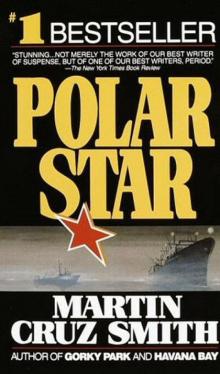 Polar Star
Polar Star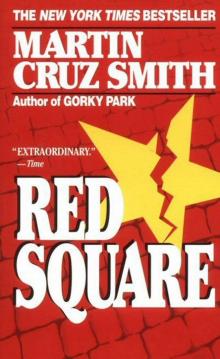 Red Square
Red Square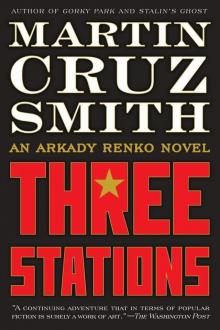 Three Stations
Three Stations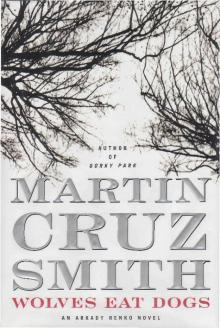 Wolves Eat Dogs
Wolves Eat Dogs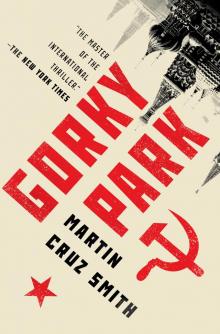 Gorky Park
Gorky Park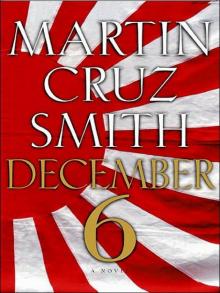 December 6
December 6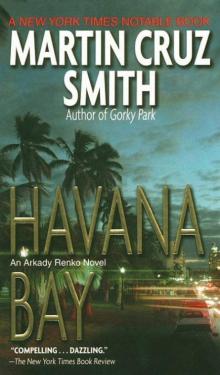 Havana Bay
Havana Bay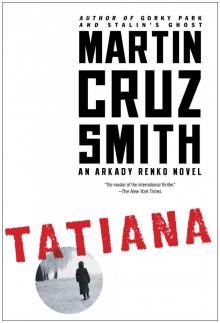 Tatiana
Tatiana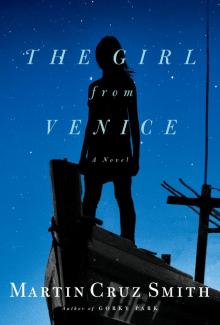 The Girl From Venice
The Girl From Venice Stalin's Ghost
Stalin's Ghost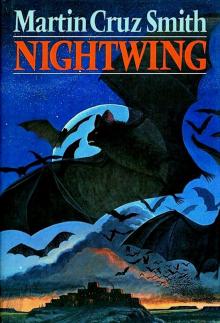 Nightwing
Nightwing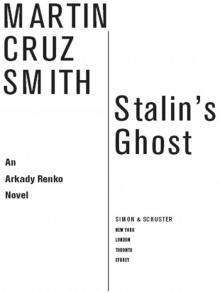 Stalin s Ghost
Stalin s Ghost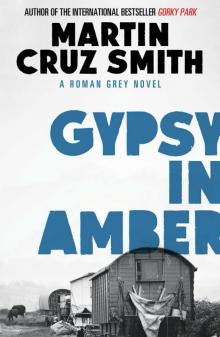 Gypsy in Amber
Gypsy in Amber Rose
Rose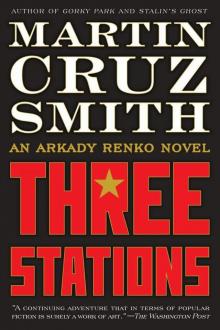 Three Stations: An Arkady Renko Novel
Three Stations: An Arkady Renko Novel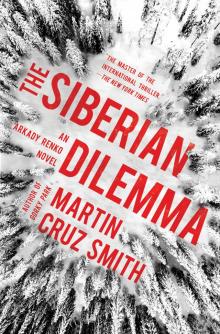 The Siberian Dilemma
The Siberian Dilemma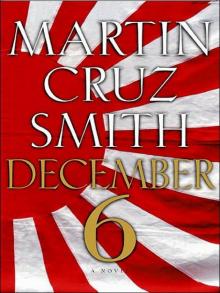 December 6 (V5.0)
December 6 (V5.0)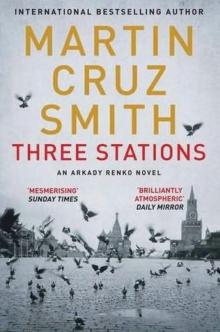 Three Stations ar-7
Three Stations ar-7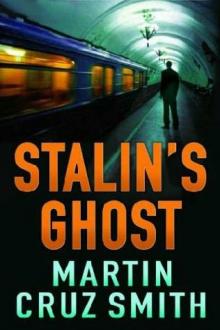 Stalin’s Ghost ar-6
Stalin’s Ghost ar-6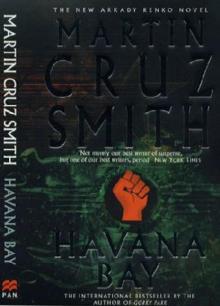 Havana Bay ar-4
Havana Bay ar-4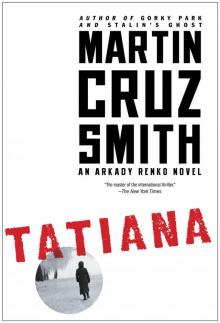 Tatiana ar-8
Tatiana ar-8